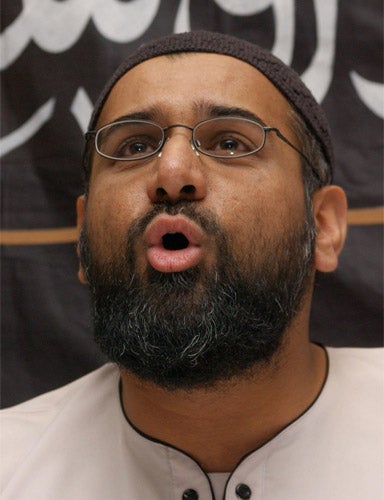Al Muhajiroun's return presents test for terror laws
Controversial Islamist group stands accused of radicalising young Muslims

A formerly defunct radical Islamist sect led by the banned preacher Omar Bakri Muhammad has appointed a new British leader and will re-form publicly this week for the first time in five years.
Al Muhajiroun, which campaigns for the implementation of sharia in Britain and once described the 9/11 hijackers as "the Magnificent 19", supposedly disbanded in 2004. Shortly after, two offshoot groups led by Bakri Muhammad – The Saved Sect and Al Ghurabaa – were outlawed by the Home Office for "glorifying terrorism".
The group, which has little support in the wider Muslim community, has since kept a low profile, operating under the name Ahl us-Sunnah wal Jamma'ah (Adherents to the Prophet's Path and the Community). Bakri Muhammad, who is Syrian, has had to preach over the internet from Lebanon after the Government revoked his leave to remain in Britain in 2005.
He remains the group's spiritual leader but Anjem Choudary, a radical based in east London and Bakri Muhammad's former spokesman, will conduct a debate tonight under the Al Muhajiroun banner – the first time it has been used publicly since 2004.
Mr Choudary's followers caused outrage in Luton when they protested against soldiers returning from Iraq, prompting local Muslims to turn on the group and force them out of town. He told The Independent: "It is a challenge to both the Government and the media to make them understand that Al Muhajiroun was never illegal in the first place. We have been demonised but there is no proof that any of our members have done anything illegal or military." Mr Choudary intends to re-launch Al Muhajiroun at a debate entitled "Sharia Law vs British Law" between himself and the Centre for Social Cohesion think-tank, which is being adjudicated by the Global Issues Society. Mr Choudary appears on debate publicity flyers as the "UK head of Al Muhajiroun and Principle [sic] of the London School of Sharia".
The re-emergence of a group which critics have accused of radicalising young Muslims will pile pressure on the Government to outlaw it. When he was prime minister, Tony Blair announced his intention to ban the group but the Government refrained from doing so once Bakri Muhammad was told he could not return to Britain.
Douglas Murray, the director of the Centre for Social Cohesion, said he had agreed to attend the debate because "his opinions have to be countered". But he said the Government should move quickly to ban the group.
"Now that Al Muhajiroun have decided to officially re-form once more, the Government should ban it immediately," he said. "Al Muhajiroun is more than a conduit for radicalisation. The legislation to proscribe it is already on the books and it should be done right away." Others argue that banning Al Muhajiroun will force its supporters underground, making it harder to keep tabs on them.
Formed in 1986 by Bakri Muhammad, who came to Britain seeking asylum from Saudi Arabia, Al Muhajiroun earned a reputation for courting controversy. Charismatic but staunchly intolerant on non-Muslims (kaffirs), the "Tottenham Ayatollah" said his aim was to see the "flag of Islam" flying over Downing Street. Before 9/11, he said he had sent hundreds of British Muslims to fight jihad in Kashmir, Chechnya and Afghanistan. The group was initially regarded as made up of little more than a loudmouth preacher with scant support, but it later emerged that Muslims involved in terrorism – including some of those convicted in 2007 of planning to blow up a shopping mall – were former members of Al Muhajiroun or had attended its meetings.
Mr Choudary said Al Muhajiroun was only involved in the "peaceful propagation" of Islam and that it was unfair to associate his group with the actions of former members who had been involved in criminal activity.
"We have a presence within numerous cities, universities and mosques and we have come across a lot of people, so to say that we radicalise people is unfair. I don't think it is a surprise that a small number of people who have met us might go on to do other things. But it is not the case that anyone who comes across us automatically becomes a radical and commits a martyrdom operation."
Terrorism laws: Licence to act?
The Government is able to ban groups that "glorify terrorism" under a provision of the Terrorism Act 2006. Before it was introduced, the Home Secretary's powers of proscription could only be used against organisations directly involved in terrorism. Defended by the Government as a tool to defeat extremists, critics say that the legislation is overly pre-emptive and stifles free speech.
Subscribe to Independent Premium to bookmark this article
Want to bookmark your favourite articles and stories to read or reference later? Start your Independent Premium subscription today.

Join our commenting forum
Join thought-provoking conversations, follow other Independent readers and see their replies